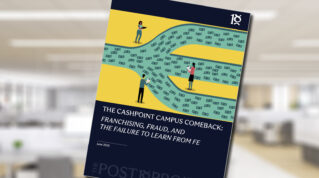With employer and government concern about skills shortages at higher technical levels, let’s shine a spotlight on the power of colleges to create the talented thinkers and workforce needed for the UK labour market: Degree awarding powers.
NCG occupies a unique position in college-based higher education (CBHE). We have held taught degree awarding powers (TDAP) for six years. Indeed, last year marked our tenth year as an awarding institution, with our power to award foundation degrees granted in 2012.
For the past six years we have had the autonomy and flexibility to validate provision from certificate in higher education to masters (level 7), passing foundation degrees (levels 4 and 5) and bachelor’s degrees (level 6) along the way. This means we can nurture the talent of our students from entry level, studying further education, all the way through to our post-graduate master’s provision.
In a blog at the start of the autumn term, Collab Group CEO, Ian Pretty talked about the UK’s collective bias toward universities. Those working in CBHE have become quite used to the prompt “… and colleges” as we remind employer groups and government alike about our level 4, 5, 6 universities “… and colleges”. We are used to sharpening our elbows as we maintain space in higher education following the removal of student number control and the drift of universities into the college-based higher education space.
But hopefully, times are changing. The recent skills and post-16 education act and all the talk of levelling up have reduced the need for the “…and college” prompt and sharp elbows. The landscape has shifted to one of higher and further education collaboration and partnership.
But collaboration must mean mutual respect for what that looks and feels like to both parties. It must be a two-way street and balanced, with both parties valued for what they are bringing to the table. Without that, it can quickly begin to take the form of a takeover, rather than collaboration.
Without mutual respect, it could quickly begin to take the form of a takeover
This new spirit of collaboration must not become a thin veil for a way of a recruiting more students into universities, with these seeing further education as feeder material at best and easy pickings at worst. It is about supporting the wider community and working with like-minded institutions. Trust, respect, clear communication will all help to create a new context for provision that ensures a steady state for students and offers them the right outcomes to succeed in their ambitions.
Which brings us back to degree awarding powers, which we must use as a sector to create a ‘by colleges, for colleges’ solution in response to the challenges the country faces of skills shortages, low productivity and a rapidly changing workplace. Designing and developing the provision we need to meet these obstacles to prosperity now requires colleges with degree awarding powers to work in partnership with further education colleges to deliver higher education.
An Office for Students’ pilot project with the Open University launched last year, trialling an offer of level-4 and -5 technical and vocational courses in partnership with FE colleges, was a good start. It recognised colleges as important to higher education delivery. But it’s still a bit “… and colleges”. Few know the needs of those furthest from higher education better than further education colleges, and this is among the most compelling reasons to team up with a college with degree awarding powers to bring innovative, technical provision to our students.
As a sector, we know that students who study college-based higher education are discerning. They make a conscious, credible, positive choice to study higher education at college. We must reject the biased deficit position that more must be done to encourage them to attend university. Students stay and succeed at college because it is great, not because they are not ready for university.
We have the power, and we have an important role to play in filling a gap that has too long held learners and the economy back. If we believe in the unique value we bring, others will believe in it too. And that can spell the end of “… and colleges”.

















Your thoughts